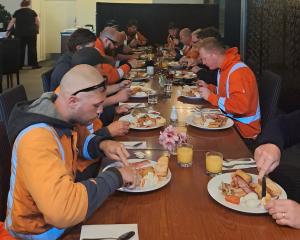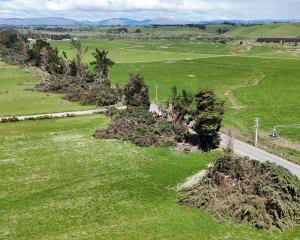The Southland mayor says the region wasn't prepared for last week's fierce storm that hammered Southland and South Otago, knocking out power, water and communications.
Southland and Clutha remain under states of local emergency and thousands of properties are still without power, with some people waking up after their fifth night cut off.
Emergency managers said it was lucky no-one was killed in the extreme winds that toppled trees and powerlines.
Southland mayor Rob Scott said the orange wind warning in place on Thursday turned red very suddenly.
"There wasn't enough time to really even let people know it had reached that level and when that storm hit it certainly hit hard as well. I guess you could say [it] kind of took everyone by surprise," he said.
He said the entire region was hammered by the wind.
"When it takes out the whole region, like you can be prepared, have back up stocks for generators and those sorts of things when you'd normally just get a particularly part or a particular town that runs into grief, but if you count Clutha as well you've got quite a large section of the South Island that's been hit," he said.
Scott said the power network did not stand a chance.
"The power network is going to be as resilient as the powerlines and when you've got trees coming down left, right and centre on to the lines, I mean you can't really prepare for that short of putting all the lines underground which is impossible, so you've got that kind of vulnerability there with the lines, same with the cellphone network" he said.
He said a lesson from this storm was that he wanted to get Starlink satellites out to all of the towns, so they had the ability to receive and send messages in a disaster.
Southland's farming community was still reeling after the winds.
While cowsheds were able to run on generators, many farm houses still did not have any power, and farmers had been working around the clock to milk their cows.
Federated Farmers Southland vice president Kass Rauber said rural communities were caught off guard.
"There's definitely a lot of tree damage, damage to farm buildings and some houses, some of the strongest winds that have ever come to Southland. But the biggest disruption has been the electricity. We're over 100 hours now since the power first went out in Southland," he said.
Rauber thought farmers would be more inclined to look into getting a generator now.
"A lot of people are set up to run generators, not everyone has a generator. Generally in an adverse event it doesn't take long to shuffle a few generators around even within the same region. With it affecting all of Southland, all of Otago parts of Canterbury, probably the resources in the way of generators was quite light on the ground," he said.
Telecommunications Forum chief executive Paul Brislen believed the telecommunications and electricity networks were in a pretty good position to respond to severe weather.
He said the Southland area had responded well, especially with the last minute red wind warning.
"Canterbury had stood up a civil defence lifeline group prior to weather arriving. We didn't have any engagement with Southland until all of a sudden all the lights went out and we said what's going on, they said we've had this massive blast of wind which has taken out a large chunk of the PowerNet network. That was our first notification there was something going on. We've been working really well with the PowerNet teams ever since to co-ordinate the restoration of telco with conjunction of restoration of electricity," he said.
Multiple generators had been brought into the area to get cell towers up and running, while smaller generators were being prioristied for dairy farms.













